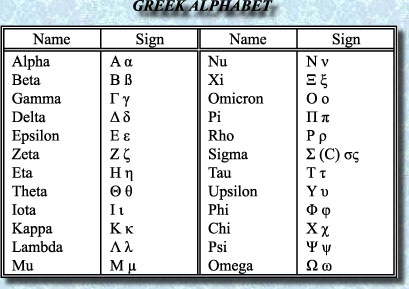

Origins - There are several theories about the origins of the Greek language. One theory suggests that it originated with a migration of proto-Greek speakers into the Greek peninsula, which is dated to any period between 2500 BC and 1700 BC. Another theory maintains that the migration into Greece occurred at a pre-proto-Greek (late PIE) stage, and the characteristic Greek sound-changes occurred later.
Linear B - The first known script for writing Greek was the Linear B syllabary, used for the archaic Mycenaean dialect. Linear B was not deciphered until 1953. After the fall of the Mycenaean civilization, there was a period of about five hundred years when writing was either not used, or nothing has survived to the present day. Since early classical times, Greek has been written in the Greek alphabet, said to be derived from Phoenician. This happened about the time of Homer, and there is one obscure, fleeting reference in Homer's poetry suggesting that he might have been aware of writing in Linear B.
Ancient Greek Dialects
.In the archaic and classical periods, there were three main dialects of the Greek language, Aeolic, Ionic, and Doric, corresponding to the three main tribes of the Greeks, the Aeolians (chiefly living in the islands of the Aegean and the west coast of Asia Minor north of Smyrna), the Ionians (mostly settled in the west coast of Asia Minor, including Smyrna and the area to the south of it), and the Dorians (primarily the Greeks of the coast of the Pelopennesus, for example of Sparta, Crete and the southernmost parts of the west coast of Asia Minor). Homer's Iliad and Odyssey were written in a kind of literary Ionic with some loan words from the other dialects. Ionic, therefore, became the primary literary language of ancient Greece until the ascendancy of Athens in the late fifth century. Doric was standard for Greek lyric poetry, such as Pindar and the choral odes of the Greek tragedians.
Attic Greek - a subdialect of Ionic, was for centuries the language of Athens. Most surviving classical Greek literature appears in Attic Greek, including the extant texts of Plato and Aristotle, which were passed down in written form from classical times.
Hellenistic Greek - Koine - As Greeks colonized from Asia Minor to Egypt to the Middle East, the Greek language began to evolve into multiple dialects. Alexander the Great (356 BC-323 BC) was instrumental in combining these dialects to form the "Koine" dialect (Greek for "common"). Imposing a common Greek dialect allowed Alexander's combined army to communicate with itself. The language was also taught to the inhabitants of the regions that Alexander conquered, turning Greek into a world language. The Greek language continued to thrive after Alexander, during the Hellenistic period (323 BC to 281 BC). During this period the Septuagint, a Greek translation of the Hebrew Bible, appeared.
For many centuries Greek was the lingua franca of the Roman Empire. It was during Roman times that the Greek New Testament appeared, and Koiné Greek is also called "New Testament Greek" after its most famous work of literature.